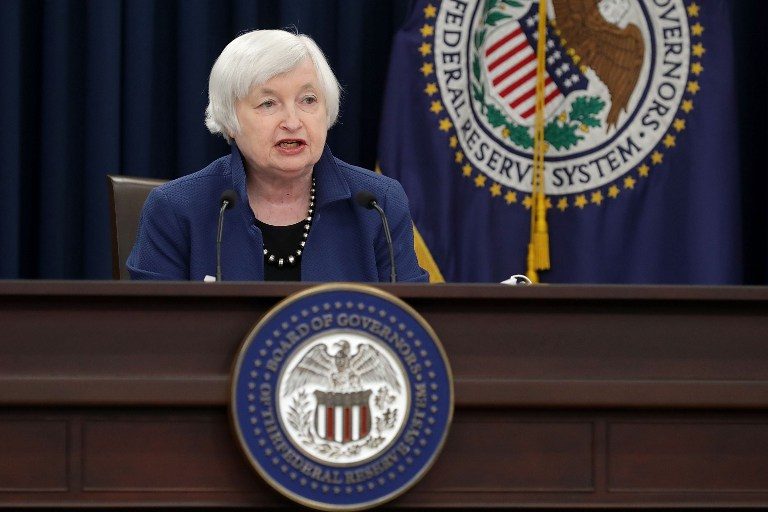SUMMARY
This is AI generated summarization, which may have errors. For context, always refer to the full article.

WASHINGTON, USA – The US Federal Reserve on Wednesday, March 15 (Thursday, March 16 in Manila), raised the benchmark interest rate a quarter point, amid rising inflation, the 2nd increase since President Donald Trump’s election and only the 3rd in a decade.
But Fed Chair Janet Yellen said policymakers had not yet discussed how the new president’s policies might impact the economy and the pace of future rate hikes, nor did she give any indication the central bank might raise rates more quickly.
She also downplayed the possibility of conflict with the Trump administration.
The Fed’s policy-setting Federal Open Market Committee (FOMC) voted to raise the key federal funds rate to a range of 0.75-1.0%, although there was one dissenting voice.
The higher benchmark interest rate will push up costs for mortgages and credit cards.
The FOMC statement noted that inflation is moving closer to the central bank’s 2% target, and “the labor market continued to strengthen” amid solid job gains, while “economic activity has continued to expand at a moderate pace.”
The FOMC once again said it expected those economic improvements to continue with only “gradual adjustments” in the policy interest rate.
And although Yellen has cautioned that policies that boost the pace of economic growth could prompt the Fed to raise rates more quickly, in a news conference following the two-day policy meeting, she told reporters there is time to see how it plays out.
“We have not discussed in detail potential policy changes, that could be put into place, and we have not tried to map out what our response would be to particular policy measures,” Yellen said about Trump’s planned tax cuts and infrastructure spending.
The Fed did not move based on any speculation about the economy, she said, and it is “still too early to know how these policies will unfold.”
“We have plenty of time to see what happens.”
But she dismissed the possibility interest rate hikes might put Yellen at odds with Trump and his efforts to boost growth.
“I don’t believe it is a point of conflict. We would certainly welcome stronger economic growth in the context of price stability.”
Two more hikes
In its quarterly economic projections, the central bankers still predict the federal funds rate will rise to 1.4% by the end of the year, which would imply another two increases, unchanged from the previous forecast.
They see the benchmark rate rising to 2.1% next year, the same as in the December Summary of Economic Projections (SEP), which would mean another two rate hikes in 2018.
The Fed’s move Wednesday was widely expected by economists, given recent signs of increased hiring and rising inflation, so attention shifted to whether the central bank would feel pressure to increase rates more than anticipated this year.
However, neither the statement nor Yellen’s comments gave any indication the Fed is poised for more rate hikes this year, although Yellen told reporters “if it’s one more or one less, I think that still, that still qualifies to my mind as gradual.”
And she said that despite the increase, the key lending rate interest rates remain low and continue to provide stimulus to the economic recovery.
“Today’s decision also reflects our view that waiting too long” to remove that stimulus amid rising inflation and a strong labor market “could potentially require us to raise rates rapidly, sometime down the road, which in turn could risk disrupting financial markets and pushing the economy into recession.”
The rest of the SEP forecasts remained unchanged as well, with the Fed members expecting economic growth of 2.1% this year and next, with an unemployment rate of 4.5%.
Fed’s preferred inflation measure, the personal consumption expenditures price index, is expected to hold at 1.9% this year, and 2.0% in 2018, which is the Fed’s target.
Neel Kashkari, president of the Minneapolis Federal Reserve Bank, voted against the increase, preferring to hold off on raising rates. – Rappler.com
Add a comment
How does this make you feel?
There are no comments yet. Add your comment to start the conversation.